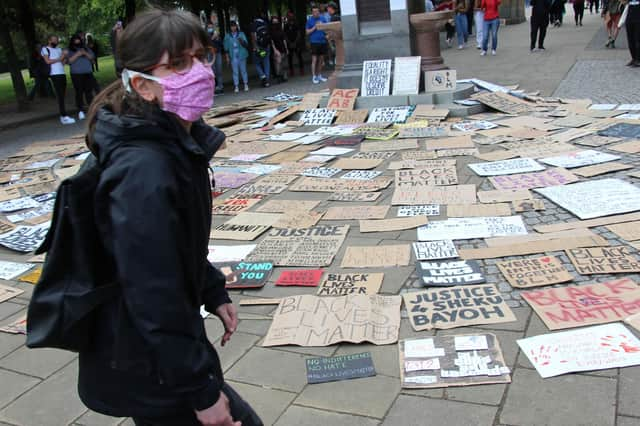Sir Tom Devine: 'Removing slavery street names is censorship'


Sir Tom Devine, emeritus professor of history at Edinburgh University, made the remarks as an online petition calling for the signs to be removed gains momentum.
Meanwhile, anti-racism campaigners have added new street names to those that honour the city’s 18th Century Tobacco Lords, who made vast riches by exporting slave-produced goods. Black activitist such as Rosa Parks, Fred Hampton and Joseph Knight are honoured instead.
Advertisement
Hide AdAdvertisement
Hide AdSir Tom Devine said he was “entirely opposed” to proposals such as those put forward in the online petition adding that, to a historian, such moves “verged on the criminal”.
He added: “These signs grew out of the fabric of our past and they need to be retained as a reminder of that past warts and all. To do otherwise is to commit the nefarious intellectual sin of censorship.
“The implication is that as values and attitudes change and opinions alter about the past,so historical artefacts considered as obnoxious have to be altered or destroyed.Where does that mindset lead ultimately?”
The online petition has been started by Glasgow woman Ciara Spatt after the statue of Bristol slave trader Edward Colston was pulled down and thrown into the harbour by protesters on Sunday.
Ms Spatt said it was time for the street names that honour Glasgow’s Tobacco Lords, who cemented Glasgow’s position as a worldwide exporter of the main goods produced by slaves, to go.
Among them are Glassford Street, named after John Glassford, once the richest 18th Century merchant in Glasgow who made a large part of his wealth from his tobacco plantations in Virginia and North Carolina.
Glassford’s trading agent, Neil Jamieson, was extensively involved in the slave trade in the Carolinas, according to accounts.
Meanwhile, Buchanan Street takes its name from Andrew Buchanan of Buchanan, a former Lord Provost of Glasgow, who built a tobacco empire in Virginia and was also involved in the trade of sugar and rum from Jamaica.
Advertisement
Hide AdAdvertisement
Hide AdIn the petition, Ms Spatt said she wanted Glasgow to follow Spain’s example of renaming streets previously named after figures from Franco’s fascist regime.
She added: “I think it’s important to take these tobacco lords off the pedestal they seemingly stand on and instead recognise other Scottish activists who are deserving of such esteem.”
Sir Tom said those named in the street signs had until very recently been regarded as “merchant heroes of Glasgow who transformed the city in the eighteenth century from a regional bankwater to a world class metropolis”.
He added: ”Modern research has very recently exposed the wickedness of the regime of chattel slavery on which their business successes entirely depended.”
Following the 1707 Act of Union between Scotland and England, Scottish merchants joined the English trade routes including ‘the triangular trade’. In the 1700s, the sugar and tobacco industries grew, along with the slave trade.
Goods such as cloth, copper and guns were shipped from Britain to West Africa to be sold or exchanged. There, captive Africans were bought and taken to the West Indies or America and sold as slaves.
The enslaved people worked on the plantations, producing raw materials such as sugar, rum, tobacco and cotton, which were shipped to Britain. Two major trading ports were Port Glasgow and Greenock.
Sir Tom said the first serious text on Scotland and black slavery, his own Recovering Scotland's Slavery Past, was published less than five years ago and said the topic shold be embedded in the school curriculum.
Advertisement
Hide AdAdvertisement
Hide AdSir Tom added: “I would suggest there are two ways forward.
“First, Scotland and slavery should be embedded firmly in the school curriculum where only the full complexity and impact can be taught to the next generation. Crucially, the subject is far from peripheral in the national story
“Second,Glasgow's 'Merchant City' should host a number of well-designed information boards explaining the darker as well as some of the more positive aspects of the area's history.”
Glasgow City Council last year comissioned Dr Stephen Mullen of Glasgow University, a specialist in Scotland’s role in the transatlantic slave trade, to carry out an indepth study into the city’s links with slavery
The study is scheduled to last most of this year.
A council spokesperson said: “While the research will look at street names, statues and buildings – it will also take a far more in-depth view of the city’s involvement.
“Once complete, the city is committed to a public consultation to determine how the Glasgow should respond to the findings – giving a voice to Glasgow’s people and, in particular, those whose lived experiences are a legacy of colonialism.
“As part of the work, Glasgow has also appointed a dedicated curator to ensure the research and the city’s response to it are reflected in our cultural estate.
“Part of that role will be to create a display on those legacies in the City Chambers – but the curator will also produce a public programme and develop a strategy for how slavery and empire are interpreted across Glasgow’s museums.”